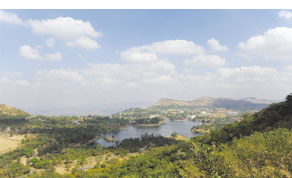IANS/Mumbai
The eco-sensitive Western Ghats along the west coast of India have been included on the coveted list of the World Heritage Sites, at a meeting of the World Heritage Committee held in Russia on Sunday evening, an official said here yesterday.

A general view of the mountains at Saputara situated in the Western Ghats, some 400km from Ahmedabad. The 1,600km long Western Ghats mountain chain has been added to the list of world heritage sites by Unesco. The Western Ghats mountain chain is recognised as one of the world’s eight “hottest hotspots” of biological diversity
“It is indeed a matter of pride for the country and the concerned states. Now that the central government has taken a strong international posture on this issue, it must, along with the concerned state governments, take tangible ground-level measures to implement it,” noted environmentalist Prof Madhav Gadgil said from Pune.
At present, India has five other natural sites and 23 cultural sites on the Unesco World Heritage List.
Spread over nearly 8,000sq km, spanning Gujarat, Maharashtra (known as the Sahyadris in the state), Karnataka, Goa, Kerala and Tamil Nadu, the Western Ghats are between 60-160km at the narrowest end points, harbouring a wealth of flora and fauna and more are being discovered regularly.
Older than the Himalayas, the mountain chain of the Western Ghats represents geomorphic features of immense importance with unique biophysical and ecological processes.
“The site’s high montane forest ecosystems influence the Indian monsoon weather pattern. Moderating the tropical climate of the region, it presents one of the best examples of the monsoon system in the planet,” the Unesco said in a statement late Sunday.
It added that the site also has an exceptionally high level of biological diversity and endemism. It is recognised as one of the world’s eight “hottest hotspots” of biological diversity.
“The forests of the site include some of the best representatives of non-equatorial tropical evergreen forests anywhere and are home to at least 325 globally threatened flora, fauna, bird, amphibian, reptile and fish species.”
However, Prof Gadgil said that many of these are under threat and has suggested setting up a statutory authority to protect the entire Western Ghats.
In 2010, Gagdil headed the Western Ghats Ecology Expert Panel (WGEEP) which submitted a comprehensive report suggesting, among other things, measures to save and protect the Western Ghats.

